Actor Michael Beck is best known for
indelibly portraying the iconic role of Swan in director Walter Hill's
fantastical, surrealistic, hit cult film, 1979's The Warriors.
Beck's dynamic and electrifying portrayal of the heroic leader of the
fictional Coney Island, New York street gang has also transformed Beck
into an icon himself among movie buffs, film critics, and fans of the
film.
This year marks the 36th anniversary of The
Warriors, and the film continues to grow as a pop culture phenomenon
with every year. Beck and his fellow Warriors cast members
continue to celebrate the film's cult classic status with their many
worldwide fans, regularly holding cast reunions and making guest panel
speeches. They also hold meet and greet appearances at many
international comics and film conventions, as well as at special Warriors fanfest
events.
The
Warriors did great things for Michael Beck's career as an actor and silver
screen star, breaking out Beck, who at the time was just beginning his
acting career. The Warriors helped to firmly establish and place
Beck on Hollywood's map, while showcasing his stellar talents to some of
film, TV, and theater's most esteemed directors and producers.
Beck is a multi-faceted, classically
trained theater actor of immense emotional depth and range. He grew up
and was raised on his father's family farm in the Arkansas delta. He
attended Millsaps College in Jackson, Mississippi on a football
scholarship, but Beck wound up portraying Romeo and Juliet's Tybalt
on a friendly dare and immediately became enamored with the craft of
acting. Beck then studied acting for three years at London's prestigious
Central School Of Speech and Drama. He then spent two more years
developing his craft performing repertory theater in the UK, taking on
the great works of Shakespeare, Chekov, and many more esteemed
playwrights.
Since then, Beck has immersed himself in
a wide diversity and range of acting roles and genres encompassing
drama, musicals, science fiction, comedy, fantasy, crime drama, and more
on stage, screen, and TV. His esteemed canon includes portraying Hans
Helms in NBC's 1978 Emmy Award winning miniseries Holocaust, and
a multitude of roles on some of TV's biggest hit shows including, Murder
She Wrote, Walker Texas Ranger, JAG, and Babylon 5.
In July of 1985, Beck returned to the U.K and to the
theater, garnering much critical acclaim for his starring role as Chance
Wayne, in a London stage production of Tennessee Williams' Sweet Bird
Of Youth. Staged at The Haymarket Theater in London's West End, the
production starred Beck with screen legend Lauren Bacall, and was
directed by the venerable playwright Harold Pinter.
Beck also starred in the emotionally rich 1987-1988,
CBS police drama Houston Knights as Sgt. Levon Lundy, a Texas cop
taking a stand for justice.
Beck also acted, danced, and roller skated!... his
way into people's hearts in his starring role as Sonny Malone, the
love-struck artist following his dreams in 1980's pop musical, romantic
fantasy, Xanadu, starring alongside Olivia Newton John and the
legendary Gene Kelly.
More recently, for more than a decade, Beck has
enjoyed a very successful voice acting career, narrating the many
audiobook adaptations of legal suspense thriller author, John Grisham's
best-selling novels. Michael's latest narrative reading is of Grisham's
newest thriller Sycamore Row. Beck has also performed and voiced
the audiobook edition of former President Bill Clinton's memoirs My
Life, and performed many more audiobook editions of novels written
by the literary world's best-selling authors.
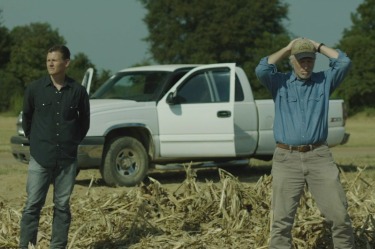 Michael
is especially proud and exuberant discussing his current return to film
acting, starring and performing in his first film in over a decade, the
critically acclaimed independent film, The Grace Of Jake.
Michael
is especially proud and exuberant discussing his current return to film
acting, starring and performing in his first film in over a decade, the
critically acclaimed independent film, The Grace Of Jake.
Directed by Chris Hicky and starring Beck, Jake La
Botz, and Jordin Sparks, The Grace Of Jake is a deeply emotional
story imbued with well-drawn, emotionally rich, nuanced characters. The
film depicts the story of the turbulent first time meeting of an
emotionally conflicted son (Jake Haynes portrayed by La Botz) with the
father he has never met (Henry Haynes portrayed by Beck). Jake learns
to deal with his chaotic emotions for his father, leaving his troubled
past behind. Jake comes to embrace the heartfelt people, soul, and
culture of the Arkansas delta setting and surroundings that form the
catalyst of the story.
For Beck, The Grace Of Jake is a project that
is a true labor of love. He joyfully relates that the movie is a
powerful and uplifting "story of redemption. Redemptive stories resonate
in me."
On a beautiful spring day the first week of May,
just a few days prior to The Grace Of Jake's world premiere at
The Little Rock Film Festival in Little Rock, Arkansas, the week of May
11-17, 2015, Beck graciously talked with me about The Grace Of Jake.
Beck also joyously expounds about the craft of
acting, his storied career, and fondly reflects on the 35th Anniversary
of Xanadu, and especially on the 36th Anniversary of The
Warriors. Beck and the cast of The Warriors will be
celebrating the anniversary when they reunite at the Atlantic City
Boardwalk Con 2015 convention, May 14-16, 2015 in Atlantic City, New
Jersey. The cast will be part of a special screening event of The
Warriors, and hold several guest speaker panels and meet and greets.
Congrats
on the premiere of
The Grace Of Jake at The Little Rock Film Festival. For people
who haven't yet seen the movie, what can you tell people about the
film's storyline, and especially about your character? How does he
relate to his son, played by actor and musician Jake La Botz?
The Grace
of Jake is the story of a man who was abandoned by his father
before he was even born, and suffers from the wounds of rejection and
the lack of a father's blessing in his life. Upon release from prison in
California, Jake's bitterness drives him across the country to the
Arkansas delta, where he hopes to seek revenge on his long lost father.
I play Henry Haynes, a local crop duster and the father in question.
How did
you become involved with this project? How did you first come to the
attention of The Grace Of Jake's director Chris Hicky?
In keeping with the title, my getting
this role was a gift of grace. A couple of years ago, my wife and I
moved back to where I had grown up in the Arkansas delta. One day I was
out fixing a leak to my water main when I got a call from a fellow named
Byron Burch. We had grown up together as kids, but I hadn't seen him in
decades. He told me that his wife, Sarah Tackett, was casting a movie
that was to begin shooting locally in about a month, and wondered if I
would be interested in reading the script. They thought I would
be perfect for the role of Henry Haynes. He told me
that writer-director, Chris Hicky was originally from Forrest City,
Arkansas, and planned to shoot the film in and around his old home town.
I read the script and loved the story. My wife Cari videoed my audition
on her iPhone, and I emailed it to Sarah who then forwarded it to Chris
in Los Angeles.
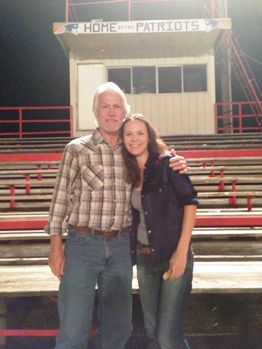 How
did he approach you for the role, and what did he see in your artistry
that he wanted you to bring to the dynamic of the film?
How
did he approach you for the role, and what did he see in your artistry
that he wanted you to bring to the dynamic of the film?
He saw something in that audition that
made him want to see more. A few days later I drove to Little Rock to
have Sarah shoot a couple more scenes for Chris. Traveling west on I-40
on the way to that audition, a bright yellow crop duster flew low across
the highway directly in front of my car. The character of Henry Haynes
is a crop duster. I knew immediately that the job was mine. As if that
were not enough, a couple of blocks before arriving at Sarah's office,
an SUV suddenly cut in front of me. Its vanity plate read FLY AG. Crop
dusters are also known as "ag" planes. I started laughing and said,
"Lord, you are so good. I know you know that I don't always pay
attention. But, come on, I got it the first time when the plane flew
across my bow." A gift of grace. And the job was mine.
The Grace Of Jake also showcases your
return to acting in over a decade. Why the lengthy hiatus from acting,
especially when so many people enjoy your creative work?
My hiatus from acting was not a
conscious choice. It is what sometimes happens in show business. I think
it was Michael Caine who once said that actors don't retire, they simply
stop getting called. In the early 90's I moved my family from Los
Angeles to Oregon. Both my wife and I grew up in rural settings, and we
didn't want to raise our kids in Hollywood. I thought at the time that I
would be able to maintain my career from long distance. However, there
is truth in the old adage, "Out of sight, out of mind."
What was
it about this particular film that creatively spoke to you and not only
drew you to the story, script, and screenplay, which Chris Hicky also
wrote, but made you want to return to acting in film?
I liked the story. It is a story of
redemption. Redemptive stories resonate in me. I was thrilled to be
given the opportunity to act again.
You were
born in Memphis, Tennessee and you grew up on your father's farm in
Arkansas. Tell me about your childhood and life growing up in the
southern delta. How has your Southern roots and upbringing informed and
influenced your creative interpretation of your role as Henry Haynes?
I grew up where the film is set.
Generations of my people come from this part of the country. I know
these folks. I am one of them. My pump got primed, through performing
the audio book version of John Grisham's Sycamore
Row the week before I
began shooting on Grace of
Jake. I was definitely in the pocket when I showed up on set.
What
inspired you to become an actor and was your first audition and acting
role? When was this and how old were you at the time?
I went to Millsaps College on a football
scholarship. Acting was not on my radar. In my junior year a friend
dared me to try out for a play. I accepted the dare, and the following
week I auditioned for the role of Tybalt in Romeo
and Juliet. I got the part and have never looked back.
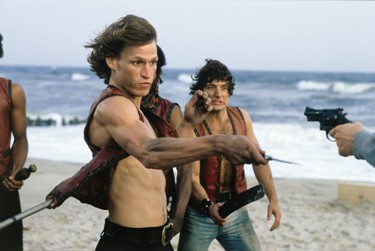 The
Warriors just
celebrated its 36th Anniversary! Your role as Swan is iconic in both
film and popular culture. How did that role come about for you?
The
Warriors just
celebrated its 36th Anniversary! Your role as Swan is iconic in both
film and popular culture. How did that role come about for you?
How I got the role of Swan in The
Warriors is an
interesting story. I went three years to drama school in London and
worked for two more in repertory theater in the UK before returning to
New York City. I had been in New York for about eighteen months when
Walter Hill came to town to shoot The Warriors. The casting
agents for the film thought of me as a classically trained theater actor
and didn't see me as a Coney Island street gang member.
Consequently, they would not submit me for the film. My agent did
everything she could to get me seen, but they were adamant that I was
not right for The Warriors. It looked like a dead issue.
How did
director Walter Hill first learn of your acting talents? What did he
think you could bring to the table?
Walter Hill was a producer of the film Alien.
[He] screened a movie called Madman to
see Sigourney Weaver on film. I played the lead role in that movie, so
Walter saw me as well. [Hill] thought that I was right for The
Warriors. I auditioned for Walter, Larry Gordon, and Frank Marshall
and got the part of Swan.
What was
it like filming on location in New York, from Coney Island, to the
subways, to the streets and parks of the city?
Filming The
Warriors in New York was
a blast. All of the cast lived in New York. For many, it was their first
film. It was exciting and exhilarating and hard work. We filmed for
eighty nights all over the city. We went to work at dusk and returned
home after daylight. We lived in an upside down universe. It was great!
We were young and having fun. Lifelong friendships were forged over
those long nights. It was a physically grueling film to shoot, with all
the running and fighting. By the time we wrapped we were in the
best shape of our lives.
What are
your creative feelings in crafting such an edgy, almost surrealistic
film and its fantasy images of gangs in colorful and iconic costumes and
make-up?
I love the movie. I love the simple
story. I love the way it looks. I love the soundtrack. I love the energy
and pace of it. It has become a cult classic, and I am grateful to
have played my part in it.
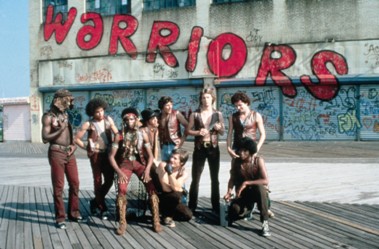 My
favorite gang that fights The Warriors is The Baseball Furies, with
their make-up and baseball uniforms. What is yours and why, and what are
your thoughts on how Walter Hill and the costume and makeup designers
choreographed that scene, The Warriors versus The Baseball Furies?
My
favorite gang that fights The Warriors is The Baseball Furies, with
their make-up and baseball uniforms. What is yours and why, and what are
your thoughts on how Walter Hill and the costume and makeup designers
choreographed that scene, The Warriors versus The Baseball Furies?
I agree with you, Arlene. The Warriors
versus The Baseball Furies confrontation is my favorite fight in the
movie. From the first sighting of those Kabuki-faced batsmen on the
street outside the subway station to the final image of the victorious
Warriors walking off into the shadows of Riverside Park, it is a
fantastic sequence. I have no idea whose creative mind came up with the
idea of that make-up with those costumes for The Baseball Furies, but it
was brilliant. Really exciting scene!
What was
it like working with such a talented ensemble of actors as James Remar
as Ajax, David Harris as Cochise, Terry Michos as Vermin, the late
Marcelino Sanchez as Rembrandt, Dorsey Wright as Cleon, Tom McKitterick
as Cowboy, Brian Tyler as Snow, and the lovely Deborah Van Valkenburgh
as Mercy?
It was wonderful working together with
such a talented cast. Life imitated art in the making of the movie. We
grew close. We had each other's backs. We became a gang. We still are a
gang almost forty years later. Whenever we get together for a
reunion, like we will on May 14-16 at the Atlantic City Boardwalk Con
2015, it is like we haven't missed a beat. We still enjoy each other's
company. We still have each other's backs.
The cast
regularly hold reunions at many international comic and film conventions
and fan fests. There are
also many fan groups and forums devoted to The
Warriors. Why do you think that after some four decades, The
Warriors still
resonates so strongly with people?
I don't know what it is about The
Warriors that resonates
across the decades with old and new fans. I suppose that question could
be asked of any film that develops a cult following. Nobody writer,
director, producers, actors, studio heads could have predicted the
lasting appeal to multiple generations that The
Warriors has enjoyed. I
am grateful to have participated in such a beloved film.
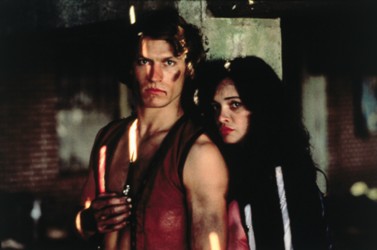 My
favorite scene is near the end of the film, on the subway going home to
Coney Island. A dirty and disheveled Swan and Mercy are sitting
together, two middle class teen couples dressed up in tuxes and gowns
from their prom get on the subway and sit opposite Swan and Mercy. Then
one teen stares at Mercy, looking her over and down on her. Mercy
awkwardly raises her hand to straighten her hair out of shame. You
gently take Mercy's hand and move it back down as if to say to her, in
spite of your differences in social class, neighborhood origins, and
economic backgrounds that Mercy should not be ashamed. She should be
proud of who she is. Then you give Mercy a corsage that one of the
couples drops when leaving the train and she asks "What's this for?" and
you reply "I just hate seeing anything go to waste." I just love that
tender, poignant, and nuanced scene, and the meaning and statement that
you, Deborah, and Walter Hill (who also co-wrote the screenplay) made.
What are your own thoughts on how that scene was written?
My
favorite scene is near the end of the film, on the subway going home to
Coney Island. A dirty and disheveled Swan and Mercy are sitting
together, two middle class teen couples dressed up in tuxes and gowns
from their prom get on the subway and sit opposite Swan and Mercy. Then
one teen stares at Mercy, looking her over and down on her. Mercy
awkwardly raises her hand to straighten her hair out of shame. You
gently take Mercy's hand and move it back down as if to say to her, in
spite of your differences in social class, neighborhood origins, and
economic backgrounds that Mercy should not be ashamed. She should be
proud of who she is. Then you give Mercy a corsage that one of the
couples drops when leaving the train and she asks "What's this for?" and
you reply "I just hate seeing anything go to waste." I just love that
tender, poignant, and nuanced scene, and the meaning and statement that
you, Deborah, and Walter Hill (who also co-wrote the screenplay) made.
What are your own thoughts on how that scene was written?
Arlene, that is also my favorite scene
in the movie. The night that Deborah and I shot our reaction to the prom
couples, there were no prom couples to be found. Their half of the scene
had been filmed a few days before. So a couple of pieces of tape on the
opposite wall of the train car stood in for them while Walter Hill
talked us through the scene. Don't you love it? The magic of movies!
This is
the 35th anniversary of Xanadu! How
did that role come about for you? What did the filmmakers want you to
bring to the dynamics of this exuberant pop musical fantasy?
Larry Gordon and Joel Silver, who
produced Xanadu, also
produced The Warriors.
It was through that connection that I was cast in the film.
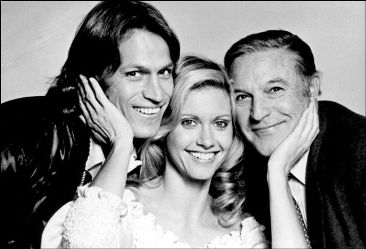 What
was your creative experience like working on that film, and with Olivia
Newton-John and especially Gene Kelly?
What
was your creative experience like working on that film, and with Olivia
Newton-John and especially Gene Kelly?
The creative experience on Xanadu was
at times difficult and frustrating, as well as, joyous and wonderful. I
loved working with Olivia. She is the down to earth, beautiful person
you hope for her to be. A wonderful lady. And Gene Kelly? Are you
kidding me? A Hollywood icon! He was thoroughly professional, personable
and very kind to me. I am glad to have had the opportunity to work with
both of them.
You've
enjoyed many memorable acting roles in TV series including Houston
Knights, Murder She Wrote, JAG,
Walker Texas Ranger, Babylon
5 and you have
performed in theater as well. What can you tell me about the creative
experiences of some of these roles, and how have all of your acting
experiences helped you to grow, stretch, and evolve artistically as an
actor and artist?
I'm impressed, Arlene, you remember my
work better than I do! I have been blessed to have played a wide variety
of different characters throughout my career which has made it fun and
challenging. Every role draws on some aspect of who I am and on my
imagination. Some roles draw from a deeper well of my being and help me
to discover more about myself, as well as the characters I play. I enjoy
getting to know them all.
I
especially liked the concept of the wonderful police drama Houston
Knights, which ran on CBS 1987-1988. Your character, Sgt. Levon Lundy
and his partner, Michael Pare's Officer Joey LaFiamma were two very well
emotionally drawn characters with a lot of rich back story. How did
that role come about for you and what was your creative experience
working on that series and with Michael Pare?
I auditioned for the role of Levon Lundy
in Houston Knights. I
read for the producers and then later for the network, and fortunately I
got the part. I loved playing Lundy a good ole boy Texas cowboy cop.
It was great fun working with Michael Pare. He is a funny guy. He was
like a mischievous kid brother. We were always laughing.
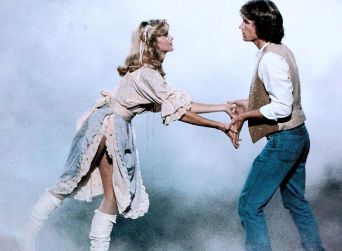 You
also have enjoyed a wonderful career narrating audio books, including
many written by legal suspense thriller author John Grisham, former
President Clinton's autobiography My Life, and many more esteemed
novels and books. How did you initially get involved with voicing
audiobooks, in particular John Grisham's and former President
Clinton's? What other books have you done?
You
also have enjoyed a wonderful career narrating audio books, including
many written by legal suspense thriller author John Grisham, former
President Clinton's autobiography My Life, and many more esteemed
novels and books. How did you initially get involved with voicing
audiobooks, in particular John Grisham's and former President
Clinton's? What other books have you done?
John Grisham's first novel was called A
Time To Kill. His
subsequent novels, The
Firm and The Pelican
Brief put him on the
bestseller lists. His publishers decided to reprint A
Time To Kill and
to release an audio version of it. The way I heard it, Mr. Grisham
was insistent that whoever performed the novel be authentic and
accurate in all the Mississippi dialects in the book. The producer in
charge became frustrated when Grisham would not okay any of the readers
she submitted. One day she mentioned her dilemma to a colleague,
who replied that he knew just the person for her: Michael Beck. This
colleague was an old friend of mine from Millsaps College days. We had
done plays together there. That was my start in the audiobook world. I
have been very fortunate to have performed many of John Grisham's
novels, in addition to other bestselling authors. Because of my
relationship with the publishers of President Clinton's My Life, examples
of my work, along with that of other readers, were submitted to him for
his approval. He chose me. I have no idea why. Maybe because we are both
from Arkansas.
How long
does it generally take to record an audio book in the recording studio?
It depends upon the length of the book.
A 400 odd page novel generally would take me about three days to record.
Have you
met former President Clinton and John Grisham? Have they, or any of the
author's that you have narrated books for, told you their creative
thoughts on your voice acting performances and interpretation of their
works?
I have not met the former President nor
John Grisham. I assume Mr. Grisham likes the way I read his books since
I have been allowed to do so many of them. And I hope President Clinton
was pleased with how I read his memoir.
You're an
author and writer as well. You were writing your first novel last I
heard. What can you tell me about that? What is your novel is
about? Was it published, and if so where can people find your book?
Are you still writing and if so what are you currently working on?
I put aside my first attempt at a novel.
It didn't come together as I had hoped. Since then I have written a
creative non-fiction book for which I am seeking publication.
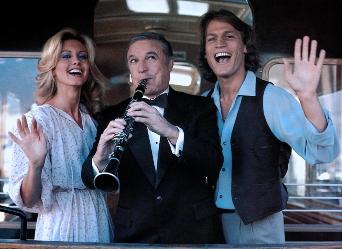 What
are some of your fondest memories as an actor?
What
are some of your fondest memories as an actor?
Filming The
Warriors is right up
there at the top. I learned so much about acting in film from that
experience, and more importantly, I made some lasting friendships. I
have fond memories of working with some of Hollywood's all-time greats:
Gene Kelly, Lauren Bacall, Richard Widmark, Lee Remick, Art Carney and
Meryl Streep. What a privilege it has been to work with artists such as
these.
You've acted in many projects that have included some great music scores
and soundtracks. The
Warriors, Xanadu, The Grace Of Jake, and Houston
Knights feature
soundtracks performed by some of music's most esteemed artists. Besides
Olivia Newton John and Jake La Botz who have acted with you, did you get
to meet any of the music artists who performed on the soundtracks? Did
you meet Joe Walsh, who composed and performed one of my favorite songs, "In
The City," the emotionally
uplifting end credits theme for The
Warriors? Also, do you have any musical talents of your own, do you
sing or play the guitar or any instruments? Have you ever played in a
band?
I did not meet Joe Walsh, but like you,
I love the song "In the
City." However, I did meet Jeff Lynne of Electric Light Orchestra during
the filming of Xanadu.
What a great band! I, however, am not musically talented. I play no
instruments. I can carry a tune, but my wife says I sing a little flat.
Guess you can't have it all.
What new creative projects are you currently working on that we can look
forward to?
At the moment, I have no projects in the
works. The Grace of Jake is
being screened at the Little Rock Film Festival during the week of May
11th. I hope fellow Arkansans come out to see it and enjoy the movie.
Email us Let us know what you think.